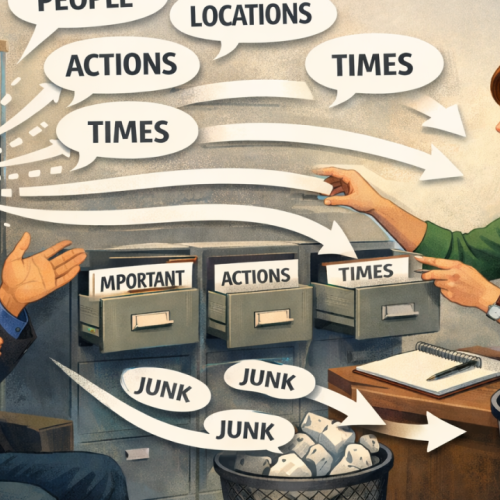Why You Can’t “Think” Your Way Into Becoming a Better Interviewer
In The Matrix, there’s a moment where Morpheus looks at Neo and says: “…there’s a difference between knowing the path and walking the path.”
That line lives rent free in my head every time I teach or sit across from another professional learning investigative interviewing.
The Seduction of Knowing
Because here’s the uncomfortable truth, knowing the science isn’t enough. We live in a time where everything about investigative interviewing is “science backed.” Every course description promises cutting edge psychological theory, evidence based frameworks, and groundbreaking research into memory and cognition. And sure, the science matters.
Understanding how memory works, why people misremember, and how to avoid contaminating recall is critical. But here’s the catch: knowing isn’t the same thing as doing.
Reading a textbook on rapport building won’t help you build rapport in a room with a terrified witness.
Understanding retrieval cues won’t magically help you choose the right ones when the clock is ticking.
Memorizing open ended questioning structures won’t make you sound natural when someone’s trust hangs in the balance.
Theory informs. Practice transforms.
Here is where many good interviewers separate themselves from great ones: they do not just know the principles, they embody them.
Walking the path means:
Sitting in silence long enough to let the other person’s story unfold, even when it’s uncomfortable.
Listening without framing your next question; allowing yourself to actually hear what’s said and unsaid.
Flexing the science in real time, adapting it to the person in front of you instead of clinging to a script.
These aren’t skills you “get” from reading about cognitive interviewing. They’re built in the doing.
In reps. In failures. In reflection. And in more reps.
The Illusion of Mastery
I’ve watched experienced investigators and seasoned detective’s trip over this one mistake: believing that because they understand the why, they automatically understand the how. They don’t. None of us do. Not until we walk it. The courses that change you don’t just feed your research, they force you to integrate it. You leave different, not just smarter.
If You’re Choosing a Investigative Interviewing Training Course Right Now
Ask yourself one question:
“Will this course teach me to know…or will it teach me to do?”
The difference matters.
Because in the courtroom, in the interview room, the trauma survivor sitting across from you, they don’t care what you know. They care how you show up. So, choose the path that forces you to step into the work. Get uncomfortable. Practice until you fail. And fail until you grow. That’s how science stops being theory and starts changing lives.
Closing Thought
If Morpheus was right, and he was, then the transformation isn’t in the learning.
It’s in the living.
It’s in the doing.
It’s in walking the path.
Because knowledge is not understanding. Walking the path is.
At a Forensic Interview Solutions training you
PRACTICE THE INTERVIEW. DON’T JUST LEARN IT"
FIS® the Leading Global Provider of P.E.A.C.E. Investigative Interviewing scenario-based training courses.
Why PEACE
Scenario-based interviewing framework that builds confident, ethical performance. Built to find facts without harm. Proven in law and science. Aligns with global standards such as the UN Méndez Principles that reject coercion and improve investigative outcomes. Evolving since 1992. Updated with the latest research and casework.
What you get
Confidence under pressure.
Consistent, defensible interviews.
Better recall, better detail, better decisions.


